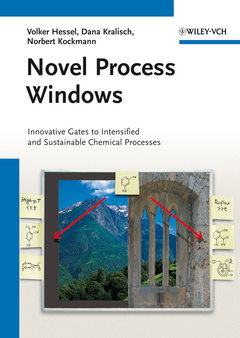Description
Novel Process Windows
Innovative Gates to Intensified and Sustainable Chemical Processes
Authors: Hessel Volker, Kralisch Dana, Kockmann Norbert
Language: EnglishApproximative price 165.11 €
In Print (Delivery period: 12 days).
Add to cart
Publication date: 03-2015
344 p. · 17.5x25.2 cm · Hardback
344 p. · 17.5x25.2 cm · Hardback
Description
/li>Contents
/li>Biography
/li>
This book introduces the concept of novel process windows, focusing on cost improvements, safety, energy and eco–efficiency throughout each step of the process. The first part presents the new reactor and process–related technologies, introducing the potential and benefit analysis. The core of the book details scenarios for unusual parameter sets and the new holistic and systemic approach to processing, while the final part analyses the implications for green and cost–efficient processing. With its practical approach, this is invaluable reading for those working in the pharmaceutical, fine chemicals, fuels and oils industries.
STARTING POINT: NOVEL PROCESS WINDOWS – INTENSIFY RATHER THAN OPTIMISE NEW TECHNOLOGIES – REACTOR AND PROCESS–RELATED Milli and Micro Process Technologies Process Intensification COMPETITIVENESS CHECK: INDUSTRY, ENVIRONMENT AND SOCIETY BOUNDARY CONDITIONS Industrial Market Growth and Competition Sustainable Development – Green Processing POTENTIAL AND BENEFIT ANALYSIS Some Relevant Major Effects of Process Miniaturisation Some Relevant, Derived Benefits of Flow Chemistry SCENARIOS FOR UNUSUAL PARAMETER SETS Contacting, Mixing, and Mass Transfer Heat Transfer Residence Time and Flow Patterns Regimes and Potential Thermal Runaway Conditions Kinetics and Reaction Rates Super–Saturation and Precipitation NEW HOLISTIC AND SYSTEMIC APPROACH – NOVEL PROCESS WINDOWS, A CONCEPTUAL SYNOPSIS New Chemical Transformations Routes at Much Elevated Temperature Routes at Much Increased High Pressure Routes at Much Increased Conentration or Even Solvent–Free Routes in the Thermal Runaway or Explosive Regime or Using Hazardous Reactants Process Integration and Simplification Opportunities Beyond Micro Processing and Flow Chemistry Industrial Implementation IMPLICATIONS OF NPW TO GREEN AND COST EFFICIENT PROCESSING Introduction Tools in Sustainability Assessment General Impact of Novel Process Windows Future Challenges in Sustainable Process Design CONCLUSIONS: MAKING CHEMICAL TRANSFORMATIONS SUITED TO FLOW PROCESSING
Volker Hessel, born 1964, is the Director of R&D and Head of the Chemical Process Technology Department at the Institute for Microtechnology Mainz GmbH (IMM), Germany. His department focuses on mixing, fine chemistry, and energy generation by fuel processing using microstructured reactors. He was awarded his Ph.D. from the University of Mainz in organic chemistry in 1993, investigating structure-property relations of supramolecular structures. After having been appointed Group Leader for Microreaction Technology at the IMM in 1996, he became head of the newly founded Department of Microreaction Technology in 1999. He is author of more than 150 peer-reviewed publications in the fields of organic chemistry and chemical micro process engineering, 200 papers in total, five books and 15 patents. In July 2005, Prof. Dr. Hessel was appointed as part-time professor for the chair of Micro Process Engineering at Eindhoven University of Technology, TU/e. This professorship is under the umbrella of the Chemical Reactor Engineering group of Prof. Dr.ir. Jaap Schouten in the Department of Chemical Engineering and Chemistry. In September, 2009, he was appointed an honorary professorship at the Technical Chemistry Department at Technical University of Darmstadt.
Dr.-Ing. habil. Norbert Kockmann, born 1966, studied mechanical engineering at Technical University of Munich and received his diploma in 1991. Dr. Kockmann was awarded his doctorate thesis in 1996 on fouling in falling film evaporators and its mitigation from The University of Bremen. In 1997, Dr. Kockmann worked as a project engineer at Messer Griesheim, Germany and was project manager for air separation units and a syngas plant. After 5 years industrial experience, he formed a research group for micro process engineering at the IMTEK Albert-Ludwig University of Freiburg, and was awarded his habilitation in 2007 on transport phenomena in micro process engineering. Since October 2007, Dr. Kockmann is senior resea
Dr.-Ing. habil. Norbert Kockmann, born 1966, studied mechanical engineering at Technical University of Munich and received his diploma in 1991. Dr. Kockmann was awarded his doctorate thesis in 1996 on fouling in falling film evaporators and its mitigation from The University of Bremen. In 1997, Dr. Kockmann worked as a project engineer at Messer Griesheim, Germany and was project manager for air separation units and a syngas plant. After 5 years industrial experience, he formed a research group for micro process engineering at the IMTEK Albert-Ludwig University of Freiburg, and was awarded his habilitation in 2007 on transport phenomena in micro process engineering. Since October 2007, Dr. Kockmann is senior resea
© 2024 LAVOISIER S.A.S.





